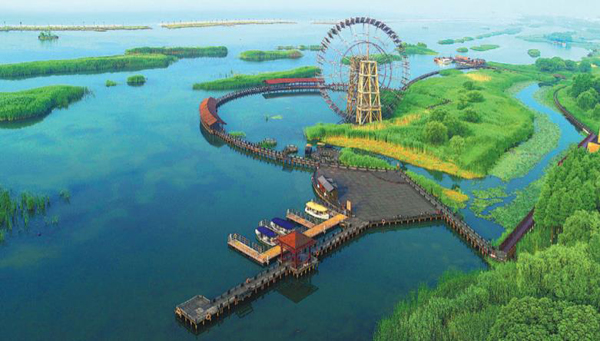
Taihu Lake in Wuzhong district is a popular tourism destination in Suzhou. [Photo by Chen Buxiang/for China Daily]
If visitors look at the section of Taihu Lake in Gonghuwan Wetland Park in Wuxi, Jiangsu province, on a sunny day they will see seemingly endless clean, transparent water, with boats floating among the reflections of white clouds and blue skies.
But 14 years ago, the lake and its surrounding area looked totally different.
In 2007, a severe outbreak of blue-green algae occurred in China's third-largest freshwater lake, leaving 1 million people without drinking water and choked by the stench of rotting plants and fish.
The lake, which covers 2,427.8 square kilometers and is located on the lower reaches of the Yangtze River, is an important source of water for 17 million local people.
To treat the pollution, especially the contamination from sewer drainage, Wuxi has established an all-weather, three-pronged system to monitor blue-green algae in the lake, including 95 automatic water-quality monitoring stations, 21 blue-green algae inspection sites and 60 algae-distribution video monitoring systems, according to the city information office.
Since 2007, authorities have removed about 27 million cubic meters of silt, which contained many kinds of pollutants, from the lake's bed. In addition, more than 10 billion cu m of water have been pumped into the lake from the Wangyu River via a massive diversion project to accelerate water flow and improve its quality.
So far, 16.6 million metric tons of blue-green algae have been removed from the lake, while 14 dedicated bases to remove the algae from the water have been constructed across the city. The bases enable authorities to treat 66,500 tons of the organism every day.
After removal, the algae is processed into organic fertilizer or burned to generate power, according to Zhang Zhenghui, deputy director of the Wuxi Blue-green Algae Treatment Office.
"The water of Taihu Lake has been improved significantly," Zhang said. "After more than 10 years of efforts, the city has devised a scientific way to treat the algae. It is under scientific monitoring and is removed by dedicated teams using specially made machines before it is treated and processed into useful resources."
To date, Wuxi has invested 75.7 billion yuan ($11.8 billion) to deal with the pollution. It has also undertaken 5,582 projects to clean the lake and closed 2,819 polluting companies, 2,243 of which were in the chemical industry.
To better monitor all the city's waterways, many of which flow into the lake, Wuxi has appointed directors for each of its 5,635 rivers, 35 lakes and 19 reservoirs. These "river directors", "lake directors" and "reservoir directors" are responsible for protecting the water under their jurisdiction and face punishment if they fail in their work.
Last year, most of the samples collected from the many monitoring sites across the lake showed that the water quality was on par with the national Level IV standard. China classifies water quality into six tiers, from Level I, which is suitable for drinking after minimal treatment, to Level VI, which is severely polluted.
The levels of phosphorus and nitrogen in the lake have also been assessed as Level IV, and have fallen by 69 percent and 28.4 percent respectively, compared with 2007.
Though the water has been ranked as slightly eutrophic-indicating a reasonably high level of nutrients, such as phosphorus and nitrogen, that help plant life to flourish-samples taken from 13 rivers flowing into and out of the lake last year showed that the quality met the national Level III standard.
Now, 23 types of water birds and more than 50 kinds of aquatic plants can be found in the Wuxi section of Lake Taihu, according to the Wuxi Blue-green Algae Treatment Office.
Meanwhile, more than 95 percent of the sewage produced in downtown Wuxi is now neutralized at professional treatment stations.
The city will continue to control pollution caused by aquaculture, agriculture and livestock and poultry farming around the lake, and launch more environmental restoration projects, Zhang said.